"Mrs. B really loves algebra, so she'll probably want to teach that."
Not she loves teaching algebra but she loves algebra. I thought it was funny/odd and then I realized, you know, I love teaching English but I love English itself, too, and many of its various components, like reading, symbolism, and poetry.
So, I thought I'd share five of my favorite poems with you guys for this Friday Five.*
1. La Muerta [The Dead Woman]
2. Cien Sonetos de Amor: XVII [One Hundred Love Sonnets XVII]
 |
| I am kind of a fan. |
That being said, it's an interesting practice to read the same poem by many different translators. They each bring a different perspective to the piece.
I am drawn to the visceral and emotionally-charged language of Neruda's political poems, like the first, and his simple, relatable, genuine language in his love poems really resonates with me.
3. the lesson of the moth
| I think most people want to be the moth but are actually the roach, including myself. |
4. Home (Bonus poem: do yourself a favor and click for the next poem when you get the bottom.)
Warsan Shire's poem Home came to my attention during the peak of the Syrian refugee crisis last year, as it probably did for many of you. The imagery is staggering and its honesty is brutal. This poem is proves that poems can be beautiful without being pretty.
5. Stone
After Home, it seems apropos to finish with a poem by author Charles Simic, who experienced displacement as a result of war. There is more to us than meets the eye, and sometimes we contain multitudes. Stone illustrates that beautifully. The subject, like the poem, should not be underestimated.
We can be hard, strong, calm, and dark while also being full of fire, light, and resilience.
Speaking of resilience, I'm adding a bonus poem because...why not?!
6. Maya Angelou's Still I Rise is an iconic, unapologetic rallying cry for Black women. I think parts of it can speak to the female experience in general, too. You can watch her recite it below, or search it up in YouTube. There are dozens to choose from, and each variation is powerful and moving.
Do you like poetry?
Share a poem that you love from school or your childhood!
What is a line from a song or poem that resonates with you?
Are you Archy or the moth?
ABK
*I'm in DC with my students so if this doesn't link, oops! Also, I would not be surprised if most of you skipped this post because, ugh, poetry, right? What is this, school?! Still, the English teacher in me can't help but wheedle: at least try one. Look at my commentary and pick the one you think you'll like. Try something new!


Maya Angelou had such talent! I love her Still I Rise...a strong message for all of us ;-)
ReplyDeleteMmm... so many treasures here.
ReplyDeleteI'm reading Neruda now (that bilingual version you have in the picture) - I go back and forth between reading it in English and then trying to piece it together in the Spanish. I'm looking forward to the day when I can just read them in Spanish. I also love reading different translations, I find that fascinating. I don't like all translations of Rilke, for example, and I had to give Rimbault a try in two different translations before I could start to understand the appeal.
I was very fond of Archy & Mehitabel as a preteen! My dad had a copy.
As a teen I loved Ted Hughes' animal poetry ("The Jaguar" "The Thought-Fox") but on rereading him as an adult, while I still love those poems, I have a hard time with the rest of him.
Thanks for the links to Warsan Shire, I had heard of her but not yet read her stuff.
I read lots of poetry but a staple in my life is Coleman Barks' translations of Rumi. Too much to choose just a line! And in addition to my poetry shelf I have a binder where I keep individual poems that have meant a lot to me over the years. e.e. cummings' "i thank you god" would be one as well. For a long time we used a couple of lines of this as part of the boys' bedtime prayers.
I miss teaching main stream English but only because I miss the content myself. I liked "teaching" poetry only because I liked when my kids came up with their own poems.
ReplyDeleteI love poetry, but in Spanish... It doesn't click in English.
ReplyDeleteIn Mexico at schools, we do poetry reciting contest, my sister was the best at reciting them!
So do you think poems can really be translated into different languages? I mean, I know people can try, but can they get it EXACTLY? Did Pablo Neruda speak English too? If so, did he do any translations.
ReplyDeleteI am that person that needs all the symbolism and the meanings of things pointed out to me.
I FREAKING LOVED THE MOTH!!! But, the no punctuation and capitalization annoyed me. But I like that poem a lot, thanks for introducing it to me!
And of course the Maya poem is the best.